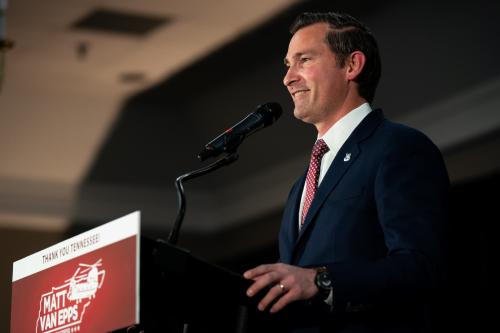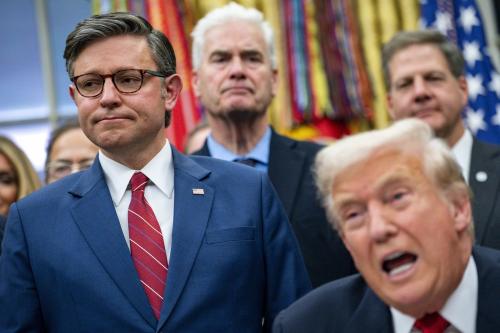There are very few Americans alive today who can remember the last time that the secretary at a national convention called the roll and no one won on the first ballot. It happened to the Republicans in 1948 when they took three ballots to nominate Thomas Dewey (who lost to President Harry Truman) and in happened to the Democrats in 1952 when they took three ballots to nominate Adlai Stevenson (who lost to Dwight D. Eisenhower.)
But just because it hasn’t happened in a long time doesn’t mean that it can’t happen. If there was ever a year for it—2016 is it.
The reason we haven’t seen a brokered convention in more than half a century is that these days the voters in the primaries and caucuses usually manage to have awarded someone the most delegates before the conventions meet. As that happens, the other candidates drop out leaving the party with one nominee. Thus when the actual delegates are chosen and go to the convention, they don silly hats and cheer for the television cameras and, off-camera, they plan to turn out the vote in November and conduct their own state and local party business.
Because the primaries get so much attention, people often forget that in the end it is the delegates who award a presidential candidate the nomination. And, here’s the kicker: there is no law anywhere that says these delegates can’t do exactly what they want to do if a majority of them decide. The Supreme Court has ruled on more than one occasion that political parties are protected by the First Amendment’s freedom of association and thus in most conflicts between state law and party rules the party rules win.
There are two things to know about conventions.
First, they unfold in the same way in a process familiar to those who know Roberts Rules of Order. The first vote is the vote on credentials. This vote establishes which group of people will be “seated” at the convention and therefore get to vote. In the 1972 Democratic convention the anti-McGovern forces mounted two famous credentials challenges. Had McGovern’s opponents won the credentials challenges, delegates who were not loyal to McGovern would have been seated and had the right to vote. As it happened, the anti-McGovern forces lost both challenges and Senator George McGovern won the nomination.
The second vote is the vote on rules. This vote establishes the rules under which the convention will operate. A draft is prepared by the Democratic National Committee and the Republican National Committee. But right before the conventions a convention rules committee votes on the rules that get sent to the convention. The convention rules committee, in contrast to the party’s rules committee, generally is controlled by forces loyal to the presidential candidates. In 1976 Ronald Reagan waged a rules fight in his attempt to deny President Gerald Ford the Republican nomination and in 1980 Senator Ted Kennedy waged a rules fight in his attempt to deny President Jimmy Carter the convention. They both lost.
Nonetheless these were serious challenges and they tested the delegate strength of those at the convention who wanted to deny the front-runner a first ballot nomination. That’s why they are called “test votes.”
The second thing to understand about brokered conventions is that they generally occur when there are deep splits inside the Party—splits that can’t be easily papered over. In 1976 the Reagan Republicans waged a fight for the “soul” of the Republican Party. Ditto the Democrats in 1980. Deep splits inside the party are generally also accompanied by a wide-spread belief that the front-runner coming into the convention is weak and almost sure to lose in November. That was certainly true for McGovern in 1972 and for Presidents’ Ford (1976) and Carter (1980)—both of whom lost.
So let’s turn to the 2016 conventions. Legally delegates are not bound on the first ballot until the convention votes to say they are bound. So, for instance, if delegates to the 2016 Republican convention want to be bound to the winner of the primary or caucus in their state they will vote to retain Rule 16 which says they should do exactly that. But if the delegates want to be freed up to vote for someone else they will vote to amend or delete Rule 16. And legally state laws requiring delegates to vote for the presidential candidate who won the state are inferior to party rules and unenforceable. (Will the Arizona state troopers really come to Cleveland to arrest delegates who vote the wrong way?)
But politically delegates are bound. The delegates themselves are elected. In some states their names actually appear on the ballot with the presidential candidates. In most states they are elected in a district meeting or a state convention where the people who vote for them expect them to go to the convention and vote for the presidential candidate they were elected to represent. In the Democratic Party the presidential candidates get to pick the delegate candidates—which means those delegates are people loyal to the candidate. That’s not the case with the Republicans—it can happen that delegates get elected in the name of one of the presidential candidates without being exactly crazy about him. Nonetheless, because the delegates themselves are elected with the expectation that they’ll vote a certain way—they would have to have a pretty darn good reason to do otherwise.
So here are a few scenarios that could lead to a brokered convention. They mostly apply to the Republicans since the Democrats have only two candidates one of them is likely to get the magic number before they meet in Philadelphia.
1. The voters don’t decide
In this instance three or more strong candidates stay in every race until June winning enough delegates to deny anyone the nomination on the first ballot. This could well happen if former Governor John Kasich wins all the delegates in his native Ohio on March 15 and if Senator Marco Rubio wins his native Florida and they both stay in the race and do well enough—along with Senator Ted Cruz—to collect delegates until the end. In this instance they could vote to pass a rule (currently Rule 16 in the Republican Party) to bind everyone on the first ballot. But if there is no winner on the first ballot the convention will proceed to a second or a third or however many it takes until there is a winner. There will be lots of wheeling and dealing in between but eventually someone will prevail.
2. The voters do decide but quickly get “buyer’s remorse”
This scenario gets a bit tricky but is entirely possible. In this instance the delegates may vote to “unbind” themselves so that delegates who have become uncomfortable with their presumptive nominee can vote for someone else. The Democratic rules bind delegates “in all good conscience,” which gives delegates a nice loophole.
To illustrate how this could happen, take as an example the 2008 Democratic race. Senator John Edwards started out a pretty strong candidate. He’d been the vice presidential nominee on the 2004 Democratic ticket and thus had considerable name recognition. But what we didn’t know while the 2008 primaries were going on was that Edwards was involved in a scandalous affair with a woman who wasn’t his wife—an affair complete with a love child and allegations of improper use of campaign funds. Had he done better in the primaries and amassed enough delegates by June to win the 2008 nomination, the odds are that the stories of his messy love life would have come out earlier—perhaps in time for some of his delegates to decide that “in all good conscience” they should vote for someone else. (As it was the scandal broke in August of 2008 and many Democrats breathed a sigh of relief.)
Given that the Republican party has not subjected Donald Trump to their usual intense “opposition research” we can imagine a scenario where information about Trump’s taxes or love life or business practices (or all of the above) emerges in the weeks before their Cleveland convention. In that case, some Trump delegates may decide that they really can’t put him at the head of the ticket and that the people back home will agree with them.
It is this point that is lost in all the worry about letting the convention delegates decide. Whether they are the so-called Democratic super-delegates or the Republican establishment—the people who end up at national conventions have been sent there by others with certain expectations. If they decide to vote for someone other than the person who the voters expect them to vote for they will have to have a very good reason. Delegates will have to go home and face the music—something that everyone in a democracy has to do at some time or another.
The Brookings Institution is committed to quality, independence, and impact.
We are supported by a diverse array of funders. In line with our values and policies, each Brookings publication represents the sole views of its author(s).




Commentary
What is a brokered convention, and are we going to have one in 2016?
March 12, 2016